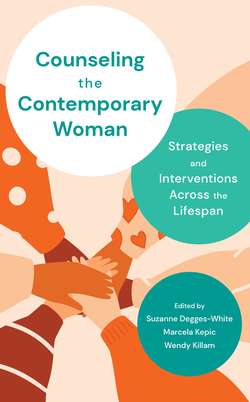Читать книгу Counseling the Contemporary Woman - Suzanne Degges-White - Страница 7
На сайте Литреса книга снята с продажи.
Multicultural and Social Justice
Counseling Foundations
ОглавлениеHistorically, the mental health professions emphasized an individual or universal approach to understanding personal development and mental health issues, prevention, and treatment, largely ignoring culture and context. In the 1960s and 1970s, the mental health professions experienced a radical shift led by counselors and psychologists of color from focusing solely on individual and universal approaches to multicultural counseling approaches that encompassed individual, cultural, and universal factors (Jackson, 1995). Their critical examination identified culturally laden, Eurocentric assumptions in the “neutral” universal-and-individual-focused counseling approaches (Katz, 1985; Sue & Sue, 1977). The multicultural approach specifically focused on racial cultural values and norms in counseling as well as the impact of privilege and oppression with four racially minoritized populations in the United States, including African Americans, Asian Americans, Native Americans, and Latinx populations.
Within-group diversity and other identities, such as gender and affectional/sexual orientation, were nominally addressed, but the emphasis was predominantly racial (Ratts, Singh, Nassar-McMillan, Butler, & McCullough, 2016). This was in large part due to the noticeable absence of race and culture in counseling theory and practice. While a narrow focus was necessary at the time, continued development in multicultural and social justice indicated a need to more fully examine cultural complexity, both to understand individual experience and the interconnected nature of oppressive systems. In the 1990s and 2000s, the multicultural movement expanded to cultural identities outside of race, commonly including gender and sexual orientation. However, there were still considerable limitations in the practice of multicultural counseling. Identifying salient cultural factors easily allowed for between-group comparisons (e.g., white people and people of color); however, client experiences in counseling indicated that counselors often overlook the sociopolitical realities of their experiences, multiple identities, and within-group variation (Hunt, Matthews, Milsom, & Lammel, 2006; McCullough et al., 2017). Solely addressing dichotomous categories of identity can result in cultural stereotyping, rather than multicultural counseling, ignoring the caution of early scholars (Sue & Sue, 1977) against overgeneralization and oversimplification.
To address these issues, the Multicultural Counseling Competencies (Arredondo et al., 1996; Sue, Arredondo, & McDavis, 1992) were revised in 2015. The Multicultural and Social Justice Counseling Competencies (MSJCC; Ratts, Singh, Nassar-McMillan, Butler, & McCullough, 2015) shifted the counseling profession toward a more comprehensive framework of multicultural counseling, operationalizing the definition set forth by the American Counseling Association (ACA) (2014) as “counseling that recognizes diversity and embraces approaches that support the worth, dignity, potential, and uniqueness of individuals within their historical, cultural, economic, political, and psychosocial contexts” (p. 20). The MSJCC embraced the complexity of cultural identity and multilayered sociopolitical contexts, emphasizing intersectionality as a meaningful framework for counselors because of its complexity and flexibility.
